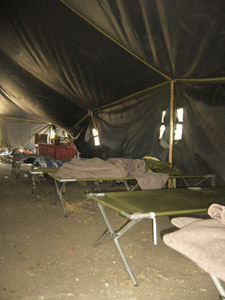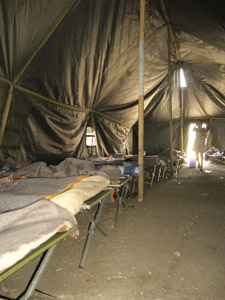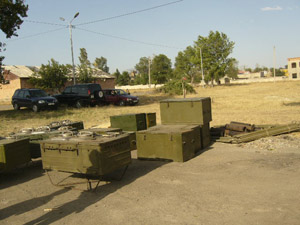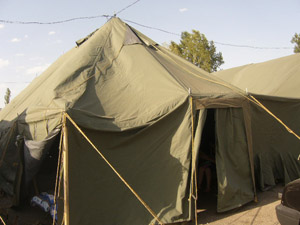Eka Kevanishvili, Tbilisi
A huge tent was set up on the field but after several hours it fell down and people sheltering under it was stuck in the tangle of the mess. An eleven-year-old boy from Tskhinvali region became scared and thought that the Russians had now started bombing Tbilisi.
 A wave of IDPs is increasing day-by-day, which has already overcrowded public schools and even kindergartens. Thus, part of them was settled in the tents in the suburbs of Tbilisi; the name of the settlement is Orkhevi. You must try hard to get to the place and then to escape from there. The wind is blowing all the time on the field. There is such dust in the air that you cannot stand going outside. There are nearly eight tents on the field; they are set up next to each other. 30, 40 iron beds are setup in each tent. Children, women, men, strangers, neighbors are lying all together; they try to sleep in clothes but they cannot. Here, nobody wants to sleep, not even to eat.
A wave of IDPs is increasing day-by-day, which has already overcrowded public schools and even kindergartens. Thus, part of them was settled in the tents in the suburbs of Tbilisi; the name of the settlement is Orkhevi. You must try hard to get to the place and then to escape from there. The wind is blowing all the time on the field. There is such dust in the air that you cannot stand going outside. There are nearly eight tents on the field; they are set up next to each other. 30, 40 iron beds are setup in each tent. Children, women, men, strangers, neighbors are lying all together; they try to sleep in clothes but they cannot. Here, nobody wants to sleep, not even to eat.
In front of the tents there are ready-made toilets and wooden shower-stands. There are ruins of some building nearby. Humanitarian aid delivered from IDPs is being distributed from these buildings.
“Irma, they have brought something for women, go and see what they have brought; if you do not hurry you will not get anything.”
She is an IDP from Tkviavi.
She has come here with her eleven-year-old son. Irma stayed with her relatives for two days only and then came here. She sheltered these tents like other people from her village, town; everybody is here-her relatives, friends: “How long time can you live in a shelter with your relative.”
Humanitarian aid is being distributed in the ruins of the building. There are plenty of toilet papers in one of the rooms in the ruined building. In another room there are hygiene napkins of woman and children; there are wet handkerchiefs too.
In the third room you will find mineral water and fizzy drinks and frozen food in the forth room.
Linen and other items are being distributed in larger room.
One of the volunteers, who assist the humanitarian aid organizations in the distribution of the aid among IDPs, is exhausted and raises his voice in anger.
‘Inhabitants of one tent cannot take all of the aid? Let me provide some of the food to others as well.”
“I have spent two days here and now I want to escape from here. The eighth tent thinks that the first one takes the whole stuff.”
It is not strange. People from Shida Kartli region has fled from their homes without money or anything. Their stories are as equal as are their new shelter; they are only being provided linen and food.
 IDPs are taking clothes from the pile of humanitarian clothes. The main point is to exchange already dirty clothes. To let one woman to change her clothes at least ten men should leave the ten; inhabitants of the tent have to take their turn.
IDPs are taking clothes from the pile of humanitarian clothes. The main point is to exchange already dirty clothes. To let one woman to change her clothes at least ten men should leave the ten; inhabitants of the tent have to take their turn.
Irma, an IDP from Tkviavi is standing outside at the car. “Let me recall how everything happened,” she said and then she starts thinking for a minute. She cannot forget the three-day-long ordeal but for now she wants to concentrate.
“We had homes in Gori and Tkviavi. My parents were in the village; I worked in Gori and had a flat there. Initially I took my mother from the village and then my father. People had already started telling terrible stories about what the Russians were doing there. I still remained in Gori. I do not remember the date when the residential building was bombed. People panicked. In one family everybody died and there was terrible chaos in the city. We calmed down a bit hoping the government would somehow manage to overcome this disaster. I cannot believe that it is true; that we have to abandon our houses and had to run away. Now I fully understand the IDPs from Abkhazia. We could endure the situation until Russians started bombing. I have a son of 11 and you should see show he tried to hide his sorrow. He is a boy and did not want to be weak. We had already packed our clothes and were waiting for the situation to become more dangerous before escaping. We were looking in the air all the time, as we were expecting Russian aircraft.
Then they deployed our Georgian reservists near our residential building. The bomb was dropped on those reservists. It was impossible to endure more. We left our houses in the clothes we were just wearing; we even forgot to take the things that we had already packed. Then I saw a strange mini-bus in the street whose driver was taking his own family to Tbilisi; I paid money and joined them.
We believed till the last moment that the disaster will be finished. I know that my parents are in my flat in Gori. The humanitarian aid has already been delivered here but it is impossible to stay in these tents. This place looks like Sahara Dessert, windy and dusty.”
Nino from Kitsnisi does not care if the wind will cause the tents to blow down and be destroyed
“The tents fell down yesterday and now you can see that it is not fixed properly again. My six-year-old boy was sleeping and he woke up scared at the noise. Children thought that Russians were bombing this place as well. We are so much stressed that everything frightens us. We are looking at the sky all the time.”
 Nino lived in the village of Kitsnisi close to Tskhinvali together with her two children. Her parents and mother-in-law are still in the conflict zone and has no information about them.
Nino lived in the village of Kitsnisi close to Tskhinvali together with her two children. Her parents and mother-in-law are still in the conflict zone and has no information about them.
“How terrible is the life in the city. Children want apple, they saw it in the street, somebody was selling it and we could not buy. There, in the village we have everything in our garden while in the city you have to pay money for fruit.”
Nino still remembers:
“Window glasses started shattering; I do not remember how we were running from home. Somebody gave us lift to Kaspi. I packed only my children’s clothes but we have taken nothing for us. One of my child three years old, the second is six was about ready to start school.
They give food to us here but there is no gas and we cannot cook food. We received a can of food yesterday but it was spicy and could not feed my children with it. I cannot give sausages from humanitarian aid to my children either; I am afraid they will poison babies. Today they have only had tea to drink. Under the circumstances I cannot concentrate on so many problems at one time. We are all embarrassed. I could never imagine how war separates people.…”
We had not finished our conversation when one tent is dismantled. The wind is getting is stronger and stronger. It is impossible to stand there without sun-glasses. Some part of people are so tired that they have no reaction and they are just sleeping and others have started setting up the tent from the very beginning.
Nineli Doloashvili comes from the village of Akhalsheni. She recalls her story in pieces. People cannot speak.
“They were continuously looting people and we saw how they were burning down houses. First we thought it was false but then we saw what was happening ourselves. Russian troops entered the villages close to the motorway. They started to smash window-glasses and broke into the houses with a sense of impunity. Soldiers even started to kill farm livestock. Part of people ran off to the mountains. Some of us reached the motorways and car passing by gave us a ride to here. If somebody resisted Russians they would have been immediately killed for putting up resistance. I have four children in Tbilisi, and three children in the village of Zerti in Gori district…”
According to final data there are 200 000 IDPs in Georgia now. 70 000 IDPs are already registered. All of them want to return home and as soon as possible. IDPs claim they would start life from the beginning as soon as they are allowed back to what is left of their homes.
A huge tent was set up on the field but after several hours it fell down and people sheltering under it was stuck in the tangle of the mess. An eleven-year-old boy from Tskhinvali region became scared and thought that the Russians had now started bombing Tbilisi.
 A wave of IDPs is increasing day-by-day, which has already overcrowded public schools and even kindergartens. Thus, part of them was settled in the tents in the suburbs of Tbilisi; the name of the settlement is Orkhevi. You must try hard to get to the place and then to escape from there. The wind is blowing all the time on the field. There is such dust in the air that you cannot stand going outside. There are nearly eight tents on the field; they are set up next to each other. 30, 40 iron beds are setup in each tent. Children, women, men, strangers, neighbors are lying all together; they try to sleep in clothes but they cannot. Here, nobody wants to sleep, not even to eat.
A wave of IDPs is increasing day-by-day, which has already overcrowded public schools and even kindergartens. Thus, part of them was settled in the tents in the suburbs of Tbilisi; the name of the settlement is Orkhevi. You must try hard to get to the place and then to escape from there. The wind is blowing all the time on the field. There is such dust in the air that you cannot stand going outside. There are nearly eight tents on the field; they are set up next to each other. 30, 40 iron beds are setup in each tent. Children, women, men, strangers, neighbors are lying all together; they try to sleep in clothes but they cannot. Here, nobody wants to sleep, not even to eat.
In front of the tents there are ready-made toilets and wooden shower-stands. There are ruins of some building nearby. Humanitarian aid delivered from IDPs is being distributed from these buildings.
“Irma, they have brought something for women, go and see what they have brought; if you do not hurry you will not get anything.”

She is an IDP from Tkviavi.
She has come here with her eleven-year-old son. Irma stayed with her relatives for two days only and then came here. She sheltered these tents like other people from her village, town; everybody is here-her relatives, friends: “How long time can you live in a shelter with your relative.”
Humanitarian aid is being distributed in the ruins of the building. There are plenty of toilet papers in one of the rooms in the ruined building. In another room there are hygiene napkins of woman and children; there are wet handkerchiefs too.
In the third room you will find mineral water and fizzy drinks and frozen food in the forth room.
Linen and other items are being distributed in larger room.
One of the volunteers, who assist the humanitarian aid organizations in the distribution of the aid among IDPs, is exhausted and raises his voice in anger.
‘Inhabitants of one tent cannot take all of the aid? Let me provide some of the food to others as well.”
“I have spent two days here and now I want to escape from here. The eighth tent thinks that the first one takes the whole stuff.”
It is not strange. People from Shida Kartli region has fled from their homes without money or anything. Their stories are as equal as are their new shelter; they are only being provided linen and food.
 IDPs are taking clothes from the pile of humanitarian clothes. The main point is to exchange already dirty clothes. To let one woman to change her clothes at least ten men should leave the ten; inhabitants of the tent have to take their turn.
IDPs are taking clothes from the pile of humanitarian clothes. The main point is to exchange already dirty clothes. To let one woman to change her clothes at least ten men should leave the ten; inhabitants of the tent have to take their turn.
Irma, an IDP from Tkviavi is standing outside at the car. “Let me recall how everything happened,” she said and then she starts thinking for a minute. She cannot forget the three-day-long ordeal but for now she wants to concentrate.
“We had homes in Gori and Tkviavi. My parents were in the village; I worked in Gori and had a flat there. Initially I took my mother from the village and then my father. People had already started telling terrible stories about what the Russians were doing there. I still remained in Gori. I do not remember the date when the residential building was bombed. People panicked. In one family everybody died and there was terrible chaos in the city. We calmed down a bit hoping the government would somehow manage to overcome this disaster. I cannot believe that it is true; that we have to abandon our houses and had to run away. Now I fully understand the IDPs from Abkhazia. We could endure the situation until Russians started bombing. I have a son of 11 and you should see show he tried to hide his sorrow. He is a boy and did not want to be weak. We had already packed our clothes and were waiting for the situation to become more dangerous before escaping. We were looking in the air all the time, as we were expecting Russian aircraft.
Then they deployed our Georgian reservists near our residential building. The bomb was dropped on those reservists. It was impossible to endure more. We left our houses in the clothes we were just wearing; we even forgot to take the things that we had already packed. Then I saw a strange mini-bus in the street whose driver was taking his own family to Tbilisi; I paid money and joined them.
We believed till the last moment that the disaster will be finished. I know that my parents are in my flat in Gori. The humanitarian aid has already been delivered here but it is impossible to stay in these tents. This place looks like Sahara Dessert, windy and dusty.”
Nino from Kitsnisi does not care if the wind will cause the tents to blow down and be destroyed
“The tents fell down yesterday and now you can see that it is not fixed properly again. My six-year-old boy was sleeping and he woke up scared at the noise. Children thought that Russians were bombing this place as well. We are so much stressed that everything frightens us. We are looking at the sky all the time.”
 Nino lived in the village of Kitsnisi close to Tskhinvali together with her two children. Her parents and mother-in-law are still in the conflict zone and has no information about them.
Nino lived in the village of Kitsnisi close to Tskhinvali together with her two children. Her parents and mother-in-law are still in the conflict zone and has no information about them.
“How terrible is the life in the city. Children want apple, they saw it in the street, somebody was selling it and we could not buy. There, in the village we have everything in our garden while in the city you have to pay money for fruit.”
Nino still remembers:
“Window glasses started shattering; I do not remember how we were running from home. Somebody gave us lift to Kaspi. I packed only my children’s clothes but we have taken nothing for us. One of my child three years old, the second is six was about ready to start school.
They give food to us here but there is no gas and we cannot cook food. We received a can of food yesterday but it was spicy and could not feed my children with it. I cannot give sausages from humanitarian aid to my children either; I am afraid they will poison babies. Today they have only had tea to drink. Under the circumstances I cannot concentrate on so many problems at one time. We are all embarrassed. I could never imagine how war separates people.…”
We had not finished our conversation when one tent is dismantled. The wind is getting is stronger and stronger. It is impossible to stand there without sun-glasses. Some part of people are so tired that they have no reaction and they are just sleeping and others have started setting up the tent from the very beginning.
Nineli Doloashvili comes from the village of Akhalsheni. She recalls her story in pieces. People cannot speak.
“They were continuously looting people and we saw how they were burning down houses. First we thought it was false but then we saw what was happening ourselves. Russian troops entered the villages close to the motorway. They started to smash window-glasses and broke into the houses with a sense of impunity. Soldiers even started to kill farm livestock. Part of people ran off to the mountains. Some of us reached the motorways and car passing by gave us a ride to here. If somebody resisted Russians they would have been immediately killed for putting up resistance. I have four children in Tbilisi, and three children in the village of Zerti in Gori district…”
According to final data there are 200 000 IDPs in Georgia now. 70 000 IDPs are already registered. All of them want to return home and as soon as possible. IDPs claim they would start life from the beginning as soon as they are allowed back to what is left of their homes.
News
December 13, 2023
Ethnic minorities outside the peace dialogue
November 6, 2023
‘Peace’ agenda of political parties
Popular
Articles
February 13, 2024



